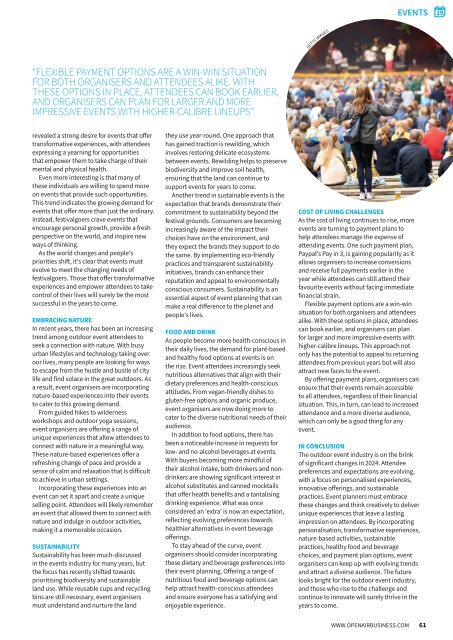Issue 62
The UK's outdoor hospitality business magazine for function venues, glamping, festivals and outdoor events
The UK's outdoor hospitality business magazine for function venues, glamping, festivals and outdoor events
Create successful ePaper yourself
Turn your PDF publications into a flip-book with our unique Google optimized e-Paper software.
EVENTS<br />
GETTY IMAGES<br />
“FLEXIBLE PAYMENT OPTIONS ARE A WIN-WIN SITUATION<br />
FOR BOTH ORGANISERS AND ATTENDEES ALIKE. WITH<br />
THESE OPTIONS IN PLACE, ATTENDEES CAN BOOK EARLIER,<br />
AND ORGANISERS CAN PLAN FOR LARGER AND MORE<br />
IMPRESSIVE EVENTS WITH HIGHER-CALIBRE LINEUPS”<br />
revealed a strong desire for events that offer<br />
transformative experiences, with attendees<br />
expressing a yearning for opportunities<br />
that empower them to take charge of their<br />
mental and physical health.<br />
Even more interesting is that many of<br />
these individuals are willing to spend more<br />
on events that provide such opportunities.<br />
This trend indicates the growing demand for<br />
events that offer more than just the ordinary.<br />
Instead, festivalgoers crave events that<br />
encourage personal growth, provide a fresh<br />
perspective on the world, and inspire new<br />
ways of thinking.<br />
As the world changes and people's<br />
priorities shift, it's clear that events must<br />
evolve to meet the changing needs of<br />
festivalgoers. Those that offer transformative<br />
experiences and empower attendees to take<br />
control of their lives will surely be the most<br />
successful in the years to come.<br />
EMBRACING NATURE<br />
In recent years, there has been an increasing<br />
trend among outdoor event attendees to<br />
seek a connection with nature. With busy<br />
urban lifestyles and technology taking over<br />
our lives, many people are looking for ways<br />
to escape from the hustle and bustle of city<br />
life and find solace in the great outdoors. As<br />
a result, event organisers are incorporating<br />
nature-based experiences into their events<br />
to cater to this growing demand.<br />
From guided hikes to wilderness<br />
workshops and outdoor yoga sessions,<br />
event organisers are offering a range of<br />
unique experiences that allow attendees to<br />
connect with nature in a meaningful way.<br />
These nature-based experiences offer a<br />
refreshing change of pace and provide a<br />
sense of calm and relaxation that is difficult<br />
to achieve in urban settings.<br />
Incorporating these experiences into an<br />
event can set it apart and create a unique<br />
selling point. Attendees will likely remember<br />
an event that allowed them to connect with<br />
nature and indulge in outdoor activities,<br />
making it a memorable occasion.<br />
SUSTAINABILITY<br />
Sustainability has been much-discussed<br />
in the events industry for many years, but<br />
the focus has recently shifted towards<br />
prioritising biodiversity and sustainable<br />
land use. While reusable cups and recycling<br />
bins are still necessary, event organisers<br />
must understand and nurture the land<br />
they use year-round. One approach that<br />
has gained traction is rewilding, which<br />
involves restoring delicate ecosystems<br />
between events. Rewilding helps to preserve<br />
biodiversity and improve soil health,<br />
ensuring that the land can continue to<br />
support events for years to come.<br />
Another trend in sustainable events is the<br />
expectation that brands demonstrate their<br />
commitment to sustainability beyond the<br />
festival grounds. Consumers are becoming<br />
increasingly aware of the impact their<br />
choices have on the environment, and<br />
they expect the brands they support to do<br />
the same. By implementing eco-friendly<br />
practices and transparent sustainability<br />
initiatives, brands can enhance their<br />
reputation and appeal to environmentally<br />
conscious consumers. Sustainability is an<br />
essential aspect of event planning that can<br />
make a real difference to the planet and<br />
people's lives.<br />
FOOD AND DRINK<br />
As people become more health-conscious in<br />
their daily lives, the demand for plant-based<br />
and healthy food options at events is on<br />
the rise. Event attendees increasingly seek<br />
nutritious alternatives that align with their<br />
dietary preferences and health-conscious<br />
attitudes. From vegan-friendly dishes to<br />
gluten-free options and organic produce,<br />
event organisers are now doing more to<br />
cater to the diverse nutritional needs of their<br />
audience.<br />
In addition to food options, there has<br />
been a noticeable increase in requests for<br />
low- and no-alcohol beverages at events.<br />
With buyers becoming more mindful of<br />
their alcohol intake, both drinkers and nondrinkers<br />
are showing significant interest in<br />
alcohol substitutes and canned mocktails<br />
that offer health benefits and a tantalising<br />
drinking experience. What was once<br />
considered an 'extra' is now an expectation,<br />
reflecting evolving preferences towards<br />
healthier alternatives in event beverage<br />
offerings.<br />
To stay ahead of the curve, event<br />
organisers should consider incorporating<br />
these dietary and beverage preferences into<br />
their event planning. Offering a range of<br />
nutritious food and beverage options can<br />
help attract health-conscious attendees<br />
and ensure everyone has a satisfying and<br />
enjoyable experience.<br />
COST OF LIVING CHALLENGES<br />
As the cost of living continues to rise, more<br />
events are turning to payment plans to<br />
help attendees manage the expense of<br />
attending events. One such payment plan,<br />
Paypal's Pay in 3, is gaining popularity as it<br />
allows organisers to increase conversions<br />
and receive full payments earlier in the<br />
year while attendees can still attend their<br />
favourite events without facing immediate<br />
financial strain.<br />
Flexible payment options are a win-win<br />
situation for both organisers and attendees<br />
alike. With these options in place, attendees<br />
can book earlier, and organisers can plan<br />
for larger and more impressive events with<br />
higher-calibre lineups. This approach not<br />
only has the potential to appeal to returning<br />
attendees from previous years but will also<br />
attract new faces to the event.<br />
By offering payment plans, organisers can<br />
ensure that their events remain accessible<br />
to all attendees, regardless of their financial<br />
situation. This, in turn, can lead to increased<br />
attendance and a more diverse audience,<br />
which can only be a good thing for any<br />
event.<br />
IN CONCLUSION<br />
The outdoor event industry is on the brink<br />
of significant changes in 2024. Attendee<br />
preferences and expectations are evolving,<br />
with a focus on personalised experiences,<br />
innovative offerings, and sustainable<br />
practices. Event planners must embrace<br />
these changes and think creatively to deliver<br />
unique experiences that leave a lasting<br />
impression on attendees. By incorporating<br />
personalisation, transformative experiences,<br />
nature-based activities, sustainable<br />
practices, healthy food and beverage<br />
choices, and payment plan options, event<br />
organisers can keep up with evolving trends<br />
and attract a diverse audience. The future<br />
looks bright for the outdoor event industry,<br />
and those who rise to the challenge and<br />
continue to innovate will surely thrive in the<br />
years to come.<br />
WWW.OPENAIRBUSINESS.COM 61

















